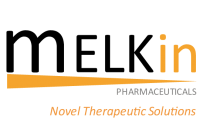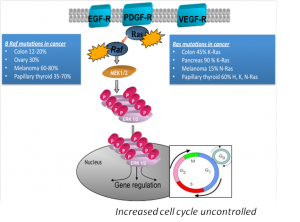Main priorities of the company are to find new treatments for cancer and brain diseases that are associated with genetic mutations and/or aberrant activation of the MAPKinase/ERK signaling pathway. First preclinical studies gave promising results in the following indications:
Oncology
Among investigated pathways involved in tumor development, many evidences suggest that the inhibition of the MAPK/ERK pathway (also known as the Ras-Raf-MEK-ERK pathway) represents an important anti-tumor strategy, actively pursued by many pharmaceutical companies for the treatment of cancer and inflammatory diseases. Indeed, because of its central role in promoting proliferation, survival and metastasis, the constitutive activity of the MAPK/ERK pathway by oncogenic RAS and RAF mutations (Figure 1) results in sustained activation of the central effector kinases ERK1/2 directly affecting both the formation and progression of a large subset of human tumors.
Schema representing the intracellular MAPK/ ERK pathway. Oncogenic mutations on Ras or Raf protein lead to aberrant hyperactivity of the signaling cascade and related cell functions allowing tumor proliferation and invasiveness. Some examples of cancer related to Ras or Raf mutations are listed.


